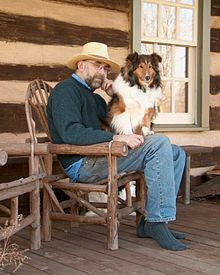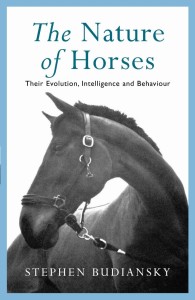Authors of horse books generally come in two varieties:
- Horsemen and women who write about their expertise. Their strength is horses.
- Writers and journalists who love horses and want to write about them. Their strength is writing.
 It’s rare to find books by authors who can clearly write and ride.
It’s rare to find books by authors who can clearly write and ride.
But they’re out there. Find more books.
The Nature of Horses: Their Intelligence, Evolution and Behaviour by Stephen Budiansky is one of them.
Budiansky grew up in Massachusetts and now lives in Virginia. He’s written for the science journal Nature, the New York Times magazine, The Economist, and writes as often about elements of war as he does of animals. Budiansky came to horsemanship as an adult and pursued not only riding but a self-directed equine education. Check out his Atlantic Monthly article on fox hunting.
The Nature of Horses covers a huge breadth of topics. I honed in on “Horse Sense,” his chapter on equine intelligence and learning behavior.
He writes:
“The good news is that horses have a relatively large brain for an animal of their size. The bad news is that they use most of it just to keep their feet in the right place.”
Budiansky questions the value judgment we make when assessing intelligence as strictly a cerebral, problem-solving deal.
— What about the incredibly coordinated movement of galloping over uneven ground, turning, jumping, dodging obstacles, changing leads?
“[It] may be a hard-wired function but it is none the less complex for being innate. “
— What about memory?
“Taught to choose which visual symbol in each of 20 pairs would bring a food reward, a horse was able to  remember them all on retesting…Retests at 3, 6, 12 months showed that horses had little loss of memory as to which symbol in each pair was the right one.”
remember them all on retesting…Retests at 3, 6, 12 months showed that horses had little loss of memory as to which symbol in each pair was the right one.”
— What about learning?
In the wild, of course, it’s all about survival. Horses adjust and adapt to “a changing environment where the rules are not fixed.” That’s part of being intelligent, too.
Read more of Budianksy’s contributions to the Intelligence article.
More highlights from The Nature of Horses:
- No breed is innately smarter than another.
- The dominant horse is not necessarily the smartest horse. The smartest tend to be in the middle of the herd rank.
- Overtraining doesn’t work; it has negative consequences. Read more about learning, dwell time, and horse neuroscience here.